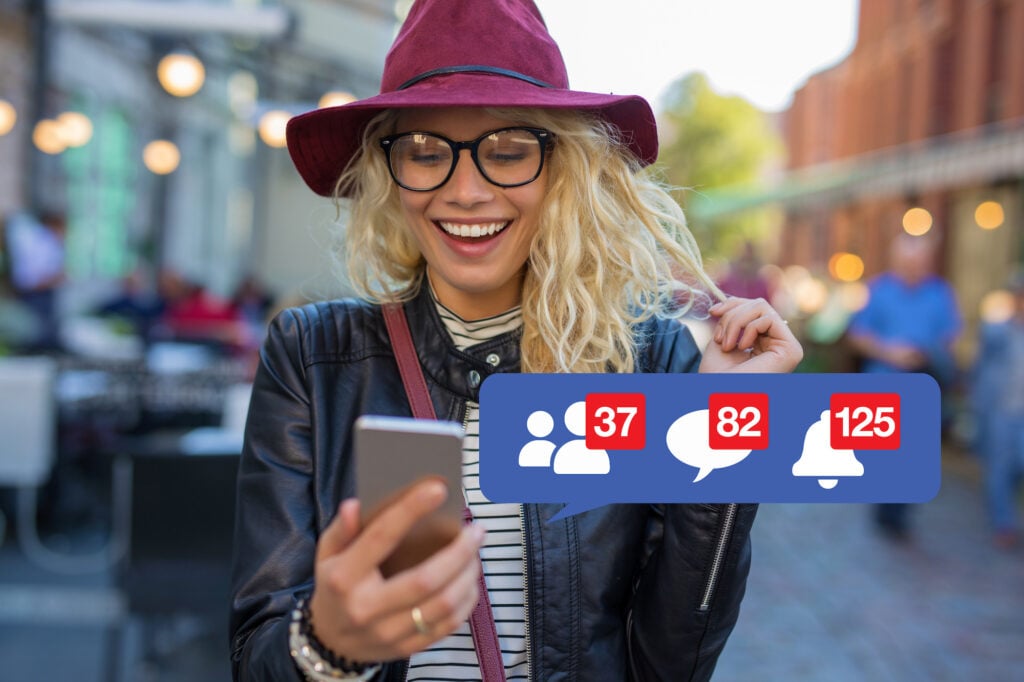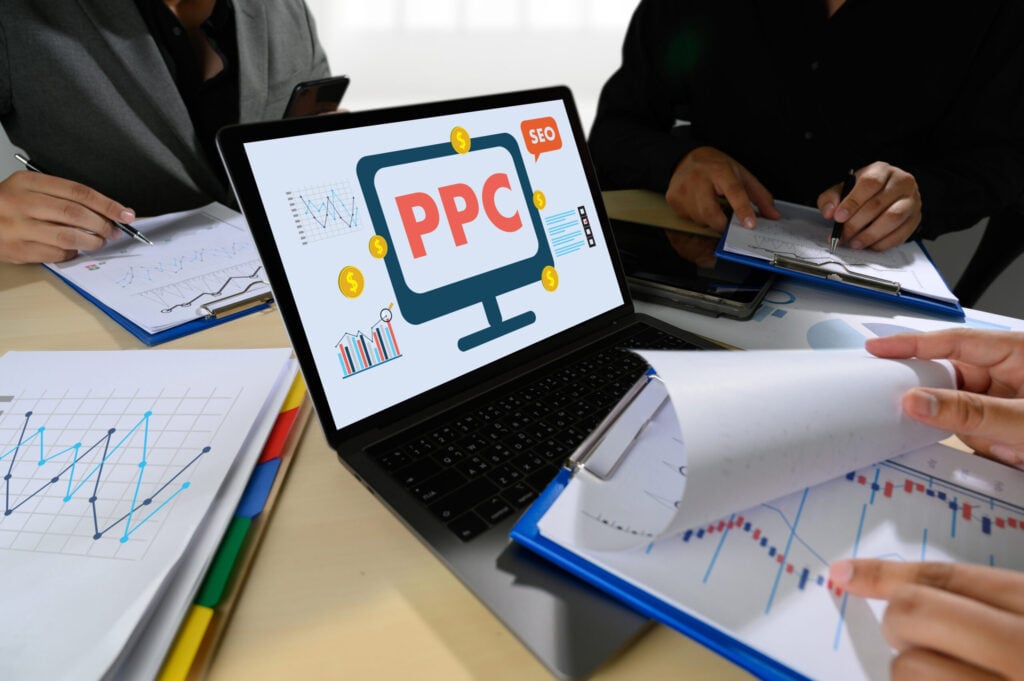Running online advertising can be a key part of a successful marketing strategy. But choosing the right advertising platform to promote your products or services is crucial.
Facebook and Google offer the most popular and cost effective ad platforms, making up 64% of the digital advertising spend in the UK*. But which one is right for your business?
Why is advertising online so important?
Regardless of the platform, when done correctly, any form of paid ads can really give your business the boost it needs. The main benefit of online advertising is that you can reach a large number of your target customers quickly and effectively.
Advertising online, whether that be through social media or Google, is a great way to drive traffic, sales and leads for your business. If you have a relatively new website, Pay Per Click (PPC) can be the key to introducing those initial users to your business.
What Are The Differences Between Google Ads and Facebook Ads?
The first – and most important – difference between Facebook Ads and Google Ads (formerly known as Google Adwords) is that on Google, the people that you are targeting are already looking for your services or products – broadly speaking. On Facebook they’re not.
Google Ads works by showing adverts to users who have inputted search queries relating to the keywords you are bidding on, so they already have intent. Facebook Ads use interests, demographics and other factors to target users Facebook believes will be interested in your product or service.
Therefore, on Google you can afford to be more ‘salesy’, whereas on Facebook you need to be more content-led and look to capture declarations of interest.
Facebook Ads
Targeting
The targeting options on any of the social networks are incredibly sophisticated.
Targeting people based on Age, Gender and Location are the more traditional ways people think of paid social, but there is so much more to it than that.
As well as being able to target people based on ‘interests’, which is an extremely extensive list, you can also target people who have:
- Previously visited your website
- Watched a video you’ve posted
- Engaged with you on Facebook or Instagram
You can even target people based on the email addresses you may have in your database.
There is also an incredibly effective tool called ‘Lookalike Audiences’. This is where Facebook finds people similar to those who visit your website or watch your videos, or are existing customers.
By utilising lookalike audiences, you’re taking the guesswork out of identifying who your target audience is.
Google Ads
Targeting
You can be as specific or broad with your targeting on Google Ads, but naturally, the more specific you can be, the better.
By creating ads based on a number of keywords you can target users looking specifically for your products or services.
When a user then searches using a term or phrase that matches the keywords you are targeting, your ad will appear for them on the search engine results page (SERP).
Like with Facebook Ads, you can create remarketing campaigns to target users who have previously visited your website. This comes in handy especially if you’re a service-based business, as you can stay at the forefront of people’s minds as they research your competitors.
You can also create audience lists based on people’s interests. For example, if you’re a home surveys provider, you can look at targeting homeowners specifically or people who are renting.
Facebook Ads
Ad formats
Images and videos make up the majority of a Facebook Ad. Like a post, you also have text in the ad, but it’s the visual element of the ad that will get people’s attention.
As Facebook owns Instagram and Messenger, the ad will appear on these platforms as well (you can turn them off if you want to) plus there are ‘stories’ on both Facebook and Instagram. So, the range of ad formats you have at your disposal is varied.
Google Ads
Ad formats
The ad format for your Google Ads depends on the type of campaign you run.
Paid search campaigns use text ads, as these are what appear on the SERP. They consist of three headlines and two descriptions.
Display campaigns, as the name suggests, use images and text and appear on the display network.
Finally, Shopping campaigns show ads above the search ads on the SERP. These use images (usually of the product) with a little description underneath.
Facebook Ads
Budget
Facebook Ads can be run from as little as £1 – £2 per day, but the recommended budget for an ad campaign will depend on the size of the audience you’re targeting.
Typically, we see the clickthrough rate (CTR) of any Facebook Ad to be between £0.09 and £0.87.
The CTR for Facebook Ads is usually a lot less than Google Ads, but it’s important to remember Facebook Ads are ‘display ads’ and the people you might be targeting might not be in a position to buy when they see your ad. That’s why it’s important to monitor the conversion rate of your ads, and not just the reach and clicks they’re generating.
Google Ads
Budget
We usually advise Google Ads budgets to be £250 minimum, with the best campaign success being shown with budgets of around £400+.
Keywords also play a major part in what your budget should be, as some are more expensive to bid on than others.
For example, if you wanted to advertise digital marketing services, to bid on ‘ppc services’ you could be charged as much as £23 per click. Whereas, if you’re a home surveys provider and want to bid on ‘home surveys’, you can be charged as little as 96p per click – it all depends on your industry.
Advantages & Strengths of Google Ads
Google Ads is constantly evolving with new, updated ways to advertise your business and brand online. From the precise targeting options, extremely measurable data and controllability of campaigns, Google Ads is a great tool for your business to use.
If you run ads yourself and find that they’re not working as well as you thought or (in some cases that we’ve seen) you need to stop the ads due to too many sales, with a simple click of one button you can pause the ads while you re-evaluate your marketing strategy.
With the different campaign types, it doesn’t matter if you’re a service-based business, or an ecommerce store, there’s a way to target your customers to achieve optimal results.

Advantages & Strengths of Facebook Ads
Facebook Ads offers a cost effective way to market to a very specific target audience. The cost per click to your website is low and unlike Google there isn’t a ‘Page One’, so you won’t be competing with other businesses as much to get yourself seen.
We often say ‘there’s no such thing as a bad ad on Facebook’, as even if your ad doesn’t bring in loads of new leads or business, the worst that is going to happen is thousands of people in your target audience are going to see your brand.
The fact images and/or videos make up the majority of your ad on Facebook means it’s a great way to showcase your products or services in an engaging way.
Which one is best for your business?
Will Facebook Ads work for your business?
There’s no denying it, Facebook Ads are extremely effective for B2C businesses, particularly ones that have an ecommerce part to their website. However, when done right, Facebook Ads can be very effective for service-based B2B businesses, as B2B businesses, as competition might not be as high in their industry or sector, so it’s a chance to stand out from the crowd.
Ideally, you should have a marketing strategy that incorporates a number of platforms and channels to promote your business, but we recognise that some things aren’t feasible.
In our opinion, businesses that should look to use Facebook Ads are:
- Businesses whose budgets don’t quite stretch to what’s required for Google Ads
- Businesses whose industry is very competitive and the keyword difficulty on Google is high
- Businesses which have never done any type of paid ads before and want to start slowly
Will Google Ads work for your business?
The key to running a successful Google Ads campaign is knowing what your customers are going to be searching for. Google’s Keyword Planner helps aid campaigns by finding the best keywords to target, looking at search volumes and bid price.
You should also make sure you have a brilliant website before driving traffic to it, especially if you’re going to be paying for ads. Google has control over the position your ads show on the SERP and one factor that goes into this is your website. If you have a strong landing page experience for your customers, your ads are more likely to see results.
In our opinion, Google Ads are more likely to work for:
- Businesses with a strong website that already drives a decent amount of traffic
- Businesses which have at least £250 per month to use for Ad Spend
- Businesses which either have an in-house PPC expert or can use an agency to manage their Google Ads campaigns
Whether you’re advertising on Facebook or Google, paid advertising can be a daunting tool to use if you have little to no experience. We always advise getting a specialist involved if you’re unsure. QBD offers account reviews of existing Facebook and Google Ads accounts and also a paid ads management service to run your campaigns at their optimum level month on month to see increases in Return On Ad Spend (ROAS) and conversions!
Talk to us today to find out more.
*Source: eMarketer.com

